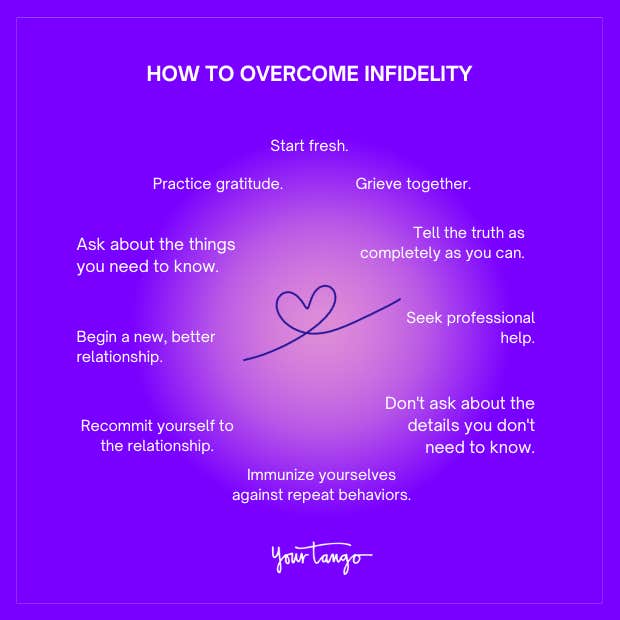How To Get Over Infidelity And Heal From Your Partner's Cheating
Your relationship can pass even the toughest test. Some studying required, but we got the answers!
 Roman Samborskyi / Shutterstock
Roman Samborskyi / Shutterstock When someone you love betrays your trust, it can feel like an insurmountable hurdle.
How will you ever trust each other again? Will they cheat on me more than once? Are we going to get divorced?
Can a relationship go back to normal after cheating?
Because of the betrayal of trust, the relationship will never be as it was before the infidelity. However, there are steps couples can take to rebuild that trust, return to a normal dynamic, and end up with a stronger relationship than before.
Of course, it's important to keep in mind that around 60 to 75 percent of relationships can be restored after an affair, provided the cheating partner is willing to cooperate. That won't be the case in every situation.
Fortunately, surviving infidelity is completely possible for couples, but only if they're willing to put in the work. This means openly communicating, reconnecting on an emotional and physical level, and being truthful along the way.
If one or both parties doesn't have the shared desire to fix the relationship, it's a big indicator that the relationship cannot be salvaged.
Learning how to move on after an affair isn't easy, but with a little TLC, your relationship can survive. Here's how to turn your relationship around, rebuild trust, and get things back on track with your partner.
How to get over infidelity
1. Practice gratitude.
No matter what happened in your marriage, gratitude will set the groundwork for positive transformation.
If you feel consumed by betrayal and despair, take a moment to focus on appreciation. Think about everything you appreciate about your mate. After a few minutes of refocusing in this way, notice what changes inside you.
2. Fully face your feelings.
When you are hurt, you may tend to blame, run, fight, judge or explain. If the betrayed spouse can stop and fully feel the heartache tenderly, they will be surprised at what is possible.
But when you face your feelings head-on, does infidelity pain ever go away? Again, you'd be surprised. When you step fully into the sensation in your heart, beyond thought and explanation, the feeling begins to shift and the pain will eventually fade.
Note: If you are suffering from a mental illness or severe emotional disturbance, use this practice only with the facilitation of a licensed therapist.
3. Clarify your purpose.
When hurt, you may tend to think about the problem. Recycling the problem can escalate the pain.
If you can focus on the solution you seek, you will naturally head toward answers.
4. Develop a deeper level of emotional intimacy.
Infidelity is almost never about sex. Rather, it is about intimacy and unmet needs.
To begin the process of getting over infidelity, you must learn how to become more emotionally intimate. This emotional intimacy comes from spending time together, communicating and sharing your lives together.
In other words, you must take a risk and be vulnerable. Give your partner a chance to draw close to you.
5. Do things together.
Couples that spend time together and have shared interests recover from infidelity much more quickly and effectively.
Discover or rediscover things that you can do together that you both enjoy. Keep in mind that not all hobbies or activities are expensive; there are plenty of things you can do together that do not cost money.
6. Form a vision of the past and the future.
One of the ways that couples can move on after infidelity is to think back to when they first met or got married. How did you fall in love? Why did you get married? What did the relationship look like back then?
Now, think about the future you wanted together — enjoying your golden years of retirement, traveling, playing with the grandchildren, enjoying family activities. What does that look like?
Develop an image of these things and how nice it can be to share this with the person you love most — the person you married.

7. Normalize your feelings.
You're mad at your partner, but you're also experiencing painful thoughts about yourself. You wonder who you are and what you meant to your partner, or if you did anything to cause this, possibly doubting your attractiveness or self-worth.
Reading books or blogs on the subject might help you see what is normal in reaction to discovering betrayal.
8. Ask about the things you need to know.
How long did this relationship last? Was it physical/sexual? What was the extent of the lies that were told in order to conceal it, and how much money was spent? Is there a risk of pregnancy?
9. Don't ask about the details you don't need to know.
Betrayed partners may have the urge to push to learn the X-rated details of the sexual encounters or ask their partner to compare them to the person they had the affair with.
My advice is: don't! Keep the focus on your relationship, not the affair partner.
10. Postpone final decisions.
It might take a long time to figure out what led to this crisis and where to go from here. Your first impulse is probably not the wisest.
But how long does it take to get over infidelity?
Unfortunately, it can take a long time to get over infidelity and won't happen overnight. Usually, it can take a minimum of two years to heal from this, maybe even more. So, try to postpone permanent decisions until you can think more clearly.
11. Ride the initial shockwave.
For the healing process to start you first have to let yourself feel.
The person who was cheated on needs to allow the initial wave of shock, pain, fear, and grief to build, and then break like a wave at the beach. Wait for this initial phase to pass before you attempt to figure out what to do in response to your new reality.
Impulsive angry actions are likely to make a bad situation worse.
12. Immunize yourselves against repeat behaviors.
As a couple, use infidelity to immunize yourself against repeat episodes.
Looking back at what happened, identify and write a list of each step down the path to its occurrence. Then, write out what each of you wishes you had done differently at each step, so you will stay safe in similar future circumstances.
13. Begin a new, better relationship.
Take a relationship education course that starts by helping you identify the weak areas in your relationship and then strengthens them for future happiness together.
The stronger your skills for talking together about sensitive issues are, the less likely you will be to drift apart or to let anger rifts lead to resentment or fights.
14. Take turns listening, even when it hurts.
Make appointments for each of you to just listen to the other. The speaker should speak briefly and let the listener paraphrase what he or she heard.
Often, the listener will hear only part of what is said. Repeat what was missed, and check before going on to the next point.
15. Tell the truth as completely as you can.
The unfaithful spouse can share the thoughts and feelings that led to the choices that were made. Doing this helps you both understand the underlying problems you face.
The injured spouse can also acknowledge his or her contribution to creating the circumstances that led to the infidelity.
16. Grieve together.
Even if you choose to stay together, something has been irretrievably lost: your innocent belief that you would be true to each other and all that implied. Whatever you create from here will be different, hopefully, better, but definitely different.
Grieving helps you give up your past dreams to make room for your future.
17. Recommit yourself to the relationship.
Healing together is difficult if not impossible when one person has their foot out the door. If you want to stay together, act like you mean it.
The betrayed partner is going to feel hurt, angry and emotional. The partner who strayed should allow this emotionality and validate it as being real by saying things like, "Of course you are feeling hurt, I messed up." The emotional fallout from infidelity can take years to heal.
18. Build trust.
Healthy relationships are built on open communication and trust. Rebuilding trust is hard, but not impossible.
You can do this by having your actions match up with your words. If you say, "I love you," back it up with loving actions. If you say, "I want our couple-ship to work," stop all contact with the affair partner and stick with it.
There is nothing worse for your partner than to find out you are not being honest.
19. Get out of denial.
The person who committed infidelity has to openly admit their wrongdoings. They need to feel regret and remorse for their actions. Be truthful, honest, and willing to cooperate with everything your mate requests from you Including to stop the affair.
Decide to fight for your family and be willing to do whatever is necessary to save your marriage. This is crucial in trying to rebuild the trust that has been so badly broken.
20. Start fresh.
Pray together, forgive one another, and allow each other time to heal in your own individual time.
Let go of old thoughts, behaviors, and anything that triggers a thirst for infidelity. Replace them with anything and anyone that encourages you to be committed, honorable and faithful in your marriage.
Seek new relationships with those who have been married for a long period of time and can share what makes their marriage work successfully.
Above all, cut off communication and contact with the third-party with whom there was an affair, including all social media, so no temptation is present.
21. Seek professional help.
Look for a marriage and family therapist who specializes in infidelity. There is a reason why the infidelity happened. Both of you need help to understand the underlying unmet needs, and how to heal from the breach in the relationship.
If you knew how to fix your problems, you would have already done it. Instead, allow marriage counseling to help you build a more mutually satisfying relationship.
Each partner must commit to individual and couples counseling. Look for a counselor who administers both practical and spiritual guidance. Without both aspects, it's impossible to heal and restore your marriage.
Cheating doesn't occur simply because that person no longer cares about you; in fact, the infidelity could be a result of a multitude of reasons. But yes, you can love somebody you cheated on. You just need to decide if they are worth forgiving.
Susan Heitler, Ph.D. is a psychologist, marriage counselor, author, founder of the Power of Two program, and a contributor to the Huffington Post, Psychology Today and more.
Laurie Moore has been featured on Fox News Live and NBC, as well as in Redbook, Readers Digest, Discovery and more.
